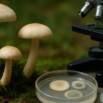
[100% Off] Mycology: The Biology, Ecology, And Applications Of Fungi
Exploring the Fascinating World of Fungi — From Ecosystems to Biotechnology and Medicine
What you’ll learn
- Understand the diversity
- structure
- and life cycles of fungi across major taxonomic groups
- Identify and describe fungal morphology including hyphae
- spores
- and mycelial structures
- Explore the genetics and molecular biology of fungal reproduction and evolution
- Recognize pathogenic fungi responsible for human
- animal
- and plant diseases
- Master laboratory techniques for fungal isolation
- culture
- and microscopic identification
- laboratory diagnosis of fungal diseases
- Diseases caused y fungi
- diseases caused y candida
- diseases caused y diphasic fungi
- diseases caused by filamintous fungi
- Antifungal drugs
- Discover the industrial and agricultural applications of fungi in food
- fermentation
- and biocontrol
- Assess the impact of fungi on climate change
- carbon cycling
- and ecosystem balance
- Explore the latest advances in synthetic biology and fungal engineering
- Build a strong foundation for careers or research in mycology
- microbiology
- or environmental science
Requirements
- microiology basics
Description
fungi are everywhere — in the soil beneath our feet, in the air we breathe, and even inside our bodies. They are essential to life on Earth, driving decomposition, nutrient recycling, and the creation of many products we rely on daily. The Biology, Ecology, and Applications of Fungi is a comprehensive course designed to introduce you to the fascinating and diverse world of fungi, blending scientific depth with real-world applications.
In this course, you’ll explore fungal structure, reproduction, and classification, and learn how these organisms interact with plants, animals, and microorganisms. You’ll discover their critical ecological roles as decomposers, pathogens, and mutualistic partners, maintaining balance within natural ecosystems and agriculture.
The course also highlights fungi’s enormous contributions to biotechnology, medicine, and industry. You’ll learn how they produce antibiotics, enzymes, and immunosuppressants, and how they’re used in fermented foods, biofuel production, and waste management. Additionally, you’ll study fungal diseases affecting plants, animals, and humans — understanding how to identify, diagnose, and manage them.
Through engaging lectures, laboratory demonstrations, and field-based learning, you’ll gain practical skills to recognize and study fungi in various environments. Special topics include fungal genetics, climate change impacts, and new frontiers in mycological research.
By the end of the course, you’ll have a strong foundation in mycology, equipping you with the knowledge and skills to pursue advanced studies or careers in biology, environmental science, biotechnology, or medicine.








